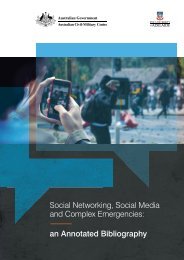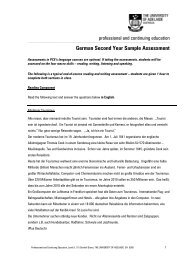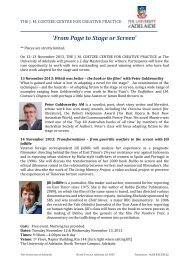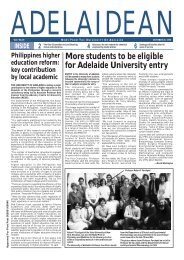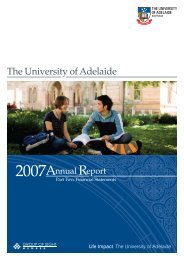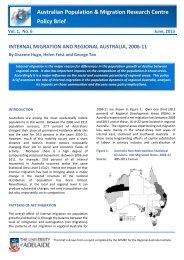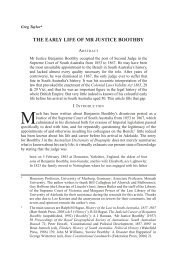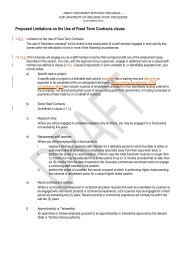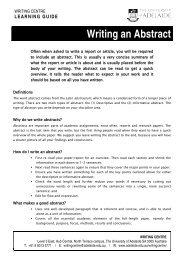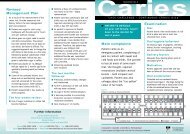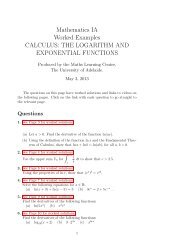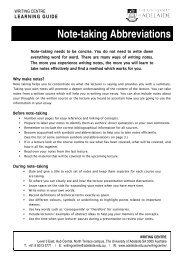Unbridling the Tongues of Women - The University of Adelaide
Unbridling the Tongues of Women - The University of Adelaide
Unbridling the Tongues of Women - The University of Adelaide
You also want an ePaper? Increase the reach of your titles
YUMPU automatically turns print PDFs into web optimized ePapers that Google loves.
<strong>Unbridling</strong> <strong>the</strong> tongues <strong>of</strong> women<br />
Visitors’ reports described <strong>the</strong> conditions <strong>of</strong> <strong>the</strong> children as ‘good’, ‘tolerable’,<br />
and ‘unsatisfactory’. Spence explained that ‘<strong>The</strong> reports marked “tolerable” and “unsatisfactory”<br />
are for <strong>the</strong> most part so designated on account <strong>of</strong> <strong>the</strong> behaviour <strong>of</strong> <strong>the</strong><br />
children, indifferent health, or irregular attendance at church or school. Very few <strong>of</strong><br />
<strong>the</strong>m are so marked on account <strong>of</strong> <strong>the</strong> badness <strong>of</strong> <strong>the</strong> home’. 41 Perhaps she disliked<br />
<strong>the</strong> thought <strong>of</strong> passing judgment on anyone else’s domestic arrangements.<br />
This was, as Margaret Barbalet has pointed out, a period in which <strong>the</strong>re was no<br />
old-age pension, no widow’s pension, no deserted wives’ pension, no child endowment,<br />
no supporting parent’s allowance. 42 That consideration makes <strong>the</strong> processes by<br />
which children arrived in <strong>the</strong> Industrial School appear less a policy directed towards<br />
breaking up those families whose poverty might be thought to constitute a drain and<br />
a danger to <strong>the</strong> state, than a piecemeal practice <strong>of</strong> preserving life and health. Emily<br />
Clark’s alarmist rhetoric derived from publications in England where <strong>the</strong> disreputable<br />
poor could more seriously be regarded as a threat to <strong>the</strong> stability <strong>of</strong> a social<br />
order prized by <strong>the</strong> middle class. It found little echo in public opinion in South<br />
Australia. In any case, <strong>the</strong> Boarding-Out Society was not concerned with <strong>the</strong> prosecutions<br />
which committed children to <strong>the</strong> Industrial School. Ra<strong>the</strong>r, it wished to<br />
rescue those children from institutional living and secure for <strong>the</strong>m satisfactory family<br />
homes. Certainly <strong>the</strong> members <strong>of</strong> <strong>the</strong> Boarding-Out Society considered that only in<br />
domestic environments could those children learn to become docile and competent<br />
domestic servants, but <strong>the</strong>ir practice was also designed to augment <strong>the</strong> families <strong>of</strong> <strong>the</strong><br />
respectable working class.<br />
Yet <strong>the</strong> very possibility <strong>of</strong> judging a household respectable or not, and <strong>the</strong> criteria<br />
used in making <strong>the</strong> judgment, <strong>of</strong>fer support to Daniels’s argument: that Spence’s<br />
work with <strong>the</strong> Boarding- Out Society was an aspect <strong>of</strong> <strong>the</strong> extension <strong>of</strong> middle-class<br />
domination <strong>of</strong> <strong>the</strong> domestic lives <strong>of</strong> <strong>the</strong> poor, and, since <strong>the</strong> quality <strong>of</strong> ‘<strong>the</strong> home’ was<br />
held to be a woman’s responsibility, simultaneously <strong>the</strong> formation <strong>of</strong> a patriarchal<br />
state apparatus for regulating <strong>the</strong> lives <strong>of</strong> at least some working-class women.<br />
However, two o<strong>the</strong>r possibilities may complicate <strong>the</strong> story a little. One springs<br />
from <strong>the</strong> Society’s vexation with Reed for disrupting <strong>the</strong> lives <strong>of</strong> households and<br />
children in order to save government funding for <strong>the</strong> boarding-out subsidies. <strong>The</strong>ir<br />
annoyance undoubtedly expressed <strong>the</strong>ir frustration at <strong>the</strong> way such interference removed<br />
<strong>the</strong>ir power as supervisors. But it may also have reflected a recognition that<br />
<strong>the</strong> subsidies <strong>of</strong>fered a real, if small, financial advantage to some households, so that<br />
86



